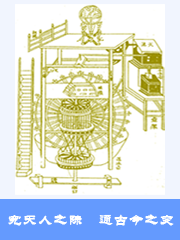The predecessor of the Institute for History of Natural Sciences (IHNS) was the Research Department on the History of Natural Sciences at CAS, which was established in January 1957 on the initiative of the Vice-president of CAS, Prof. ZHU Kezhen. The Department was expanded to become a research institute in 1975, forming a multidisciplinary and comprehensive national institute specialized in the study of the history of science and technology (S&T). The current Director is ZHANG Baichun.
As a comprehensive research institute combining the sciences and humanities, the IHNS focuses on the study of the history, nature, and routes and models of the development of science and technology. It is committed to understanding the complex interactions that exist between science, technology, society and culture, revealing trends in S&T, proposing influential strategic advice, and disseminating scientific ideas, so as to make unique contributions to building the national knowledge base and advisory structure. It pursues the highest levels of excellence in the study of history of Chinese S&T, as well as in related research fields, making it a distinctive, high-level and internationally influential institute, as well as a core center for nurturing talent in the history of S&T.
The research structure of the IHNS has been institutionalized as three departments and several research centers as follows: Department of History of Science and Technology in Pre-Modern China; Department Two: Department of History of Science and Technology in Modern China; Department of History of Science and Technology in the West; Center for Scientific Studies on Cultural Heritage, CAS; Center for the Study on the Development Strategies of Individual Disciplines,Academic Divisions of CAS; Center for the History of CAS; Center for Science and Culture;Center for Comparative Studies of the Development of Science and Technology in China and other Countries.
For over 50 years, the IHNS has been conducting in-depth monographic research on various research fields, including the history of mathematics, astronomy, physics, chemistry, geography, geology, biology, medicine and technology in pre-modern China, as well as history of the transmission of S&T between China and other countries, and has also conducted some groundbreaking research on the history of S&T in modern China. Over 400 books have been written, edited and published, and more than 5,000 articles published. Around 50 books have won national book awards, the CAS Natural Science Award and provincial-level and ministry-level S&T achievement awards.
The 28-volume Series on History of Science and Technology in Pre-Modern China compiled by the IHNS is one of the most prominent outcomes in this field, completed by generations of Chinese historians, among which two volumes, written by IHNS staff, won the highest honor in the field of historical studies in China, the Guo Moruo Chinese History Award.
After the Cultural Revolution, the IHNS has carried out extensive international academic exchanges and cooperation, and has sponsored and organized many international conferences, symposia, forums, workshops and seminars. Since the 1990s, the IHNS has also established exchange and cooperation relationships with institutions in more than 20 countries around the globe, including MPIWG, RAS-IHST, CNRS, TU Berlin, Tübingen University, Needham Research Institute, EFEO, and so on. A number of scholars from the IHNS play increasingly important roles in the international academic community of the history of S&T. In 2005, the IHNS successfully held the 22nd International Congress of History of Science in Beijing.
Now, in 2019, the Institute has a staff of 102, of whom more than 80 are researchers. In addition, there are more than 50 postgraduate students. It is a key organization for nurturing postgraduate students in the field of history of S&T and such related fields as philosophy of science in China. Thus far, 337 students have been awarded Masters or Doctoral degrees, including several foreign students and a few Chinese students co-supervised with foreign institutions.




